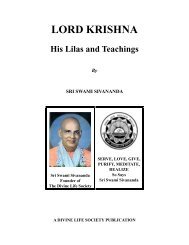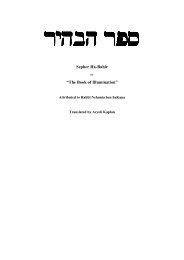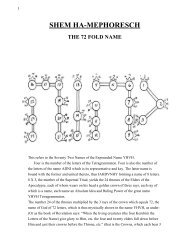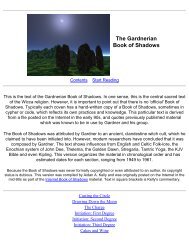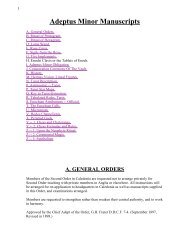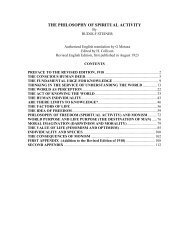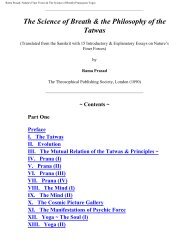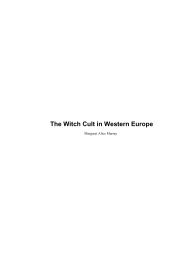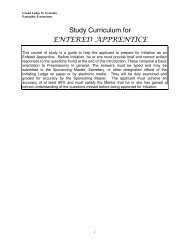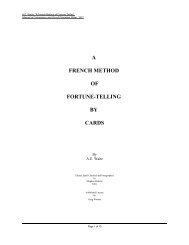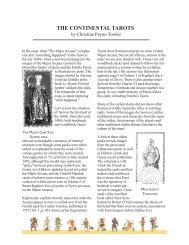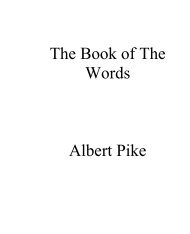Band 2 Anthropogenesis - H.P. Blavatsky
Band 2 Anthropogenesis - H.P. Blavatsky
Band 2 Anthropogenesis - H.P. Blavatsky
Create successful ePaper yourself
Turn your PDF publications into a flip-book with our unique Google optimized e-Paper software.
in its spiritual aspects and emanations, nor in its physical atoms, can ever be at "absolute rest" except during the "Nights"<br />
of Brahma. Hence, also, the "first-born" are those who are first set in motion at the beginning of a Manvantara, and thus<br />
the first to fall into the lower spheres of materiality. They who are called in Theology "the Thrones," and are the "Seat of<br />
God," must be the first incarnated men on Earth; and it becomes comprehensible, if we think of the endless series of past<br />
Manvantaras, to find that the last had to come first, and the first last. We find, in short, that the higher Angels had broken,<br />
countless aeons before, through the "Seven Circles," and thus robbed them of the Sacred fire;<br />
------------------------------------------------------------------------<br />
[[Vol. 2, Page]] 81 MAN, A GOD IN ANIMAL FORM.<br />
which means in plain words, that they had assimilated during their past incarnations, in lower as well as in higher worlds,<br />
all the wisdom therefrom -- the reflection of MAHAT in its various degrees of intensity. No Entity, whether angelic or<br />
human, can reach the state of Nirvana, or of absolute purity, except through aeons of suffering and the knowledge of<br />
EVIL as well as of good, as otherwise the latter remains incomprehensible.<br />
Between man and the animal -- whose Monads (or Jivas) are fundamentally identical -- there is the impassable abyss of<br />
Mentality and Self-consciousness. What is human mind in its higher aspect, whence comes it, if it is not a portion of the<br />
essence -- and, in some rare cases of incarnation, the very essence -- of a higher Being: one from a higher and divine<br />
plane? Can man -- a god in the animal form -- be the product of Material Nature by evolution alone, even as is the animal,<br />
which differs from man in external shape, but by no means in the materials of its physical fabric, and is informed by the<br />
same, though undeveloped, Monad -- seeing that the intellectual potentialities of the two differ as the Sun does from the<br />
Glow-worm? And what is it that creates such difference, unless man is an animal plus a living god within his physical<br />
shell? Let us pause and ask ourselves seriously the question, regardless of the vagaries and sophisms of both the<br />
materialistic and the psychological modern sciences.<br />
To some extent, it is admitted that even the esoteric teaching is allegorical. To make the latter comprehensible to the<br />
average intelligence, requires the use of symbols cast in an intelligible form. Hence the allegorical and semi-mythical<br />
narratives in the exoteric, and the (only) semi-metaphysical and objective representations in the esoteric teachings. For<br />
the purely and transcendentally spiritual conceptions are adapted only to the perceptions of those who "see without eyes,<br />
hear without ears, and sense without organs," according to the graphic expression of the Commentary. The too puritan<br />
idealist is at liberty to spiritualise the tenet, whereas the modern psychologist would simply try to spirit away our "fallen,"<br />
yet still divine, human Soul in its connection with Buddhi.<br />
The mystery attached to the highly spiritual ancestors of the divine man within the earthly man is very great. His dual<br />
creation is hinted at in the Puranas, though its esoteric meaning can be approached only by collating together the many<br />
varying accounts, and reading them in their symbolical and allegorical character. So it is in the Bible, both in Genesis and<br />
even in the Epistles of Paul. For that creator, who is called in the second chapter of Genesis the "Lord God," is in the<br />
original the Elohim, or Gods (the Lords), in the plural; and while one of them makes the earthly Adam of dust, the other<br />
breathes into him the breath of life, and the third makes of him a living soul (ii. 7), all of which readings<br />
------------------------------------------------------------------------<br />
[[Vol. 2, Page]] 82 THE SECRET DOCTRINE.<br />
are implied in the plural number of the Elohim.* "The first man is of the Earth, the second (the last, or rather highest) is<br />
from heaven," says Paul in I. Corinthians xv. 47.<br />
In the Aryan allegory the rebellious Sons of Brahma are all represented as holy ascetics and Yogis. Re-born in every<br />
Kalpa, they generally try to impede the work of human procreation. When Daksha, the chief of the Prajapati (creators),<br />
brings forth 10,000 sons for the purpose of peopling the world, Narada -- a son of Brahma, the great Rishi, and virtually a<br />
"Kumara," if not so in name -- interferes with, and twice frustrates Daksha's aim, by persuading those Sons to remain holy<br />
ascetics and eschew marriage. For this, Daksha curses Narada to be re-born as a man, as Brahma had cursed him<br />
before for refusing to marry, and obtain progeny, saying:-- "Perish in thy present (Deva or angelic) form and take up thy<br />
abode in the womb," i.e., become a man (Vayu Purana; Harivamsa, 170). Notwithstanding several conflicting versions of<br />
the same story, it is easy to see that Narada belongs to that class of Brahma's, "first-born," who have all proven rebellious<br />
to the law of animal procreation, for which they had to incarnate as men. Of all the Vedic Rishis, Narada, as already<br />
shown, is the most incomprehensible, because the most closely connected with the occult doctrines -- especially with the<br />
secret cycles and Kalpas (vide supra).<br />
Certain contradictory statements about this Sage have much distracted the Orientalists. Thus he is shown as refusing<br />
positively to create (have progeny), and even as calling his father Brahma "a false teacher" for advising him to get<br />
married ("Narada-Pancha-Ratra"); nevertheless, he is referred to as one of the Prajapati, "progenitors"! In Naradiya<br />
Purana, he describes the laws and the duties of the celibate adepts; and as these occult duties do not happen to be<br />
found in the fragment of about 3,000 Stanzas in the possession of European museums, the Brahmins are proclaimed<br />
liars; the Orientalists forgetting that the Naradiya is credited with containing 25,000 Stanzas, and that it is not very likely<br />
that such MSS. should be found in the hands of the Hindu profane, those who are ready to sell any precious olla for a red<br />
pottage. Suffice it to say, that Narada is<br />
[[Footnote(s)]] -------------------------------------------------<br />
* Seth, as Bunsen and others have shown, is not only the primitive god of the Semites -- early Jews included -- but also<br />
their "semi-divine ancestor." For, says Bunsen ("God in History," vol. i, pp. 233, 234), "the Seth of Genesis, the father of<br />
Enoch (the man) must be considered as originally running parallel with that derived from the Elohim, Adam's father."<br />
"According to Bunsen, the Deity (the god Seth) was the primitive god of Northern Egypt and Palestine" (Staniland Wake,<br />
"The Great Pyramid"). And Seth became considered in the later Theology of the Egyptians as "AN EVIL DAEMON," says<br />
the same Bunsen, for he is one with Typhon and one with the Hindu demons as a logical sequel.<br />
------------------------------------------------------------------------<br />
[[Vol. 2, Page]] 83 "FIRES," "SPARKS," AND "FLAMES."



